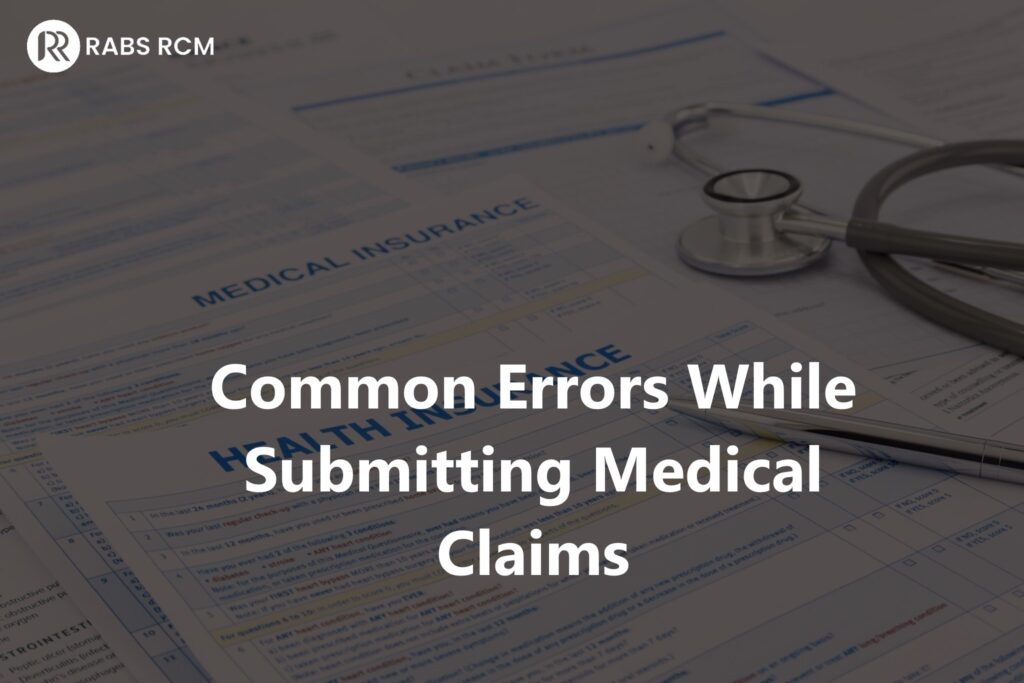Copyright © 2022 Rabs-RCM. All Rights Reserved.

Common Errors While Submitting Medical Claims
In the intricate landscape of medical billing and coding, accuracy is paramount. Every step, from patient diagnosis to reimbursement, relies heavily on the precision of submitted claims. Errors in medical claims not only delay payments but also lead to compliance issues and potential legal ramifications. Therefore, understanding and avoiding common pitfalls in this process is essential for healthcare providers and billing professionals.
The Importance of Accuracy in Medical Claims
Medical claims serve as the bridge between healthcare providers and insurance companies. They detail the services provided to patients and request payment for those services. Any inaccuracies within these claims can lead to denials, delayed payments, or audits. Moreover, they can negatively impact patient care by causing disruptions in service delivery.
Common Errors in Medical Claims
1. Inaccurate Patient Information
One of the most common errors occurs at the beginning of the process – entering patient information incorrectly. Simple mistakes such as misspelling the patient’s name, inputting the wrong date of birth, or using an outdated insurance ID can lead to claim rejections. Verifying and double-checking patient details during registration can prevent such errors.
2. Incorrect Codes
Medical coding involves assigning specific alphanumeric codes to diagnoses, procedures, and services rendered during a patient visit. Errors in code selection or application can result in claim denials or underpayment. It’s crucial to stay updated with current code sets (such as ICD-10-CM for diagnoses and CPT/HCPCS for procedures) and ensure proper documentation supports billed codes.
3. Lack of Documentation
Insufficient or incomplete documentation is a significant contributor to claim denials. Clear and thorough documentation of patient encounters, including diagnoses, treatments, and procedures performed, is essential for accurate coding and billing. Without proper documentation, claims lack the necessary support to withstand scrutiny during audits or reviews.
4. Billing for Non-Covered Services
Submitting claims for services not covered by the patient’s insurance plan is a common error leading to claim denials. It’s crucial to verify coverage and eligibility before providing services to patients. Educating staff on insurance coverage policies and conducting eligibility checks can help prevent this issue.
5. Failure to Follow Coding Guidelines
Coding guidelines provide specific instructions on how to assign codes accurately. Ignoring or misinterpreting these guidelines can lead to errors in code selection. Familiarizing oneself with coding guidelines and ensuring compliance is essential for accurate medical coding and billing.
6. Duplicate Billing
Intentionally or unintentionally, submitting duplicate claims for the same service is a standard error resulting in claim denials and audits. Implementing robust billing software with built-in checks for duplicate claims can help mitigate this risk.
Strategies for Error Prevention
1. Ongoing Training and Education
Continuous training and education for billing and coding staff are crucial to staying updated with evolving regulations, coding guidelines, and best practices. Investing in professional development ensures staff members have the knowledge and skills to perform their roles effectively.
2. Utilize Technology
Implementing electronic health record (EHR) systems and billing software can streamline the billing process and reduce the likelihood of errors. These systems often include built-in checks and validations to catch errors before submitting claims.
3. Perform Regular Audits
Conducting routine audits of medical claims can help identify and address errors proactively. By reviewing claims data regularly, healthcare providers can pinpoint areas for improvement and implement corrective measures to prevent future errors.
4. Establish Clear Communication Channels
Establishing clear communication channels between healthcare providers, billing staff, and insurance companies is essential for resolving claim issues promptly. Encouraging open dialogue and collaboration can streamline the claims resolution process and reduce payment delays.
5. Outsource Billing Services
For smaller healthcare practices or those lacking dedicated billing staff, outsourcing billing services to reputable third-party vendors can alleviate the burden of claims processing. These vendors specialize in medical billing and coding and can help ensure accuracy and compliance with regulations.
Conclusion
Accurate medical billing and coding are essential for healthcare practices’ financial health and quality patient care delivery. By understanding and avoiding common errors in the claims submission process, healthcare providers and billing professionals can improve reimbursement rates, reduce claim denials, and maintain compliance with regulatory requirements. Investing in ongoing training, leveraging technology, and implementing robust processes are vital to achieving accuracy in medical claims processing. Healthcare organizations can optimize revenue cycles and enhance operational efficiency by prioritizing accuracy and attention to detail.
By adhering to these principles, healthcare providers can minimize errors in medical claims and optimize reimbursement rates, ultimately improving their practices’ financial health and ensuring quality patient care.

- Our seamless and streamlined efforts, experience, as well as commitment to our clients, all come together to provide both you and your patients with a remarkable experience to remember.
Contact Us
- 2612 62nd St NW Rochester MN 55901 (USA)
- (507) 262-4566
- info@rabs-rcm.com

